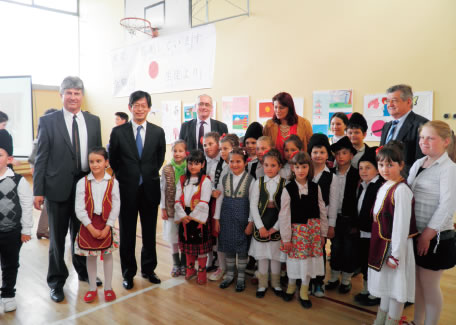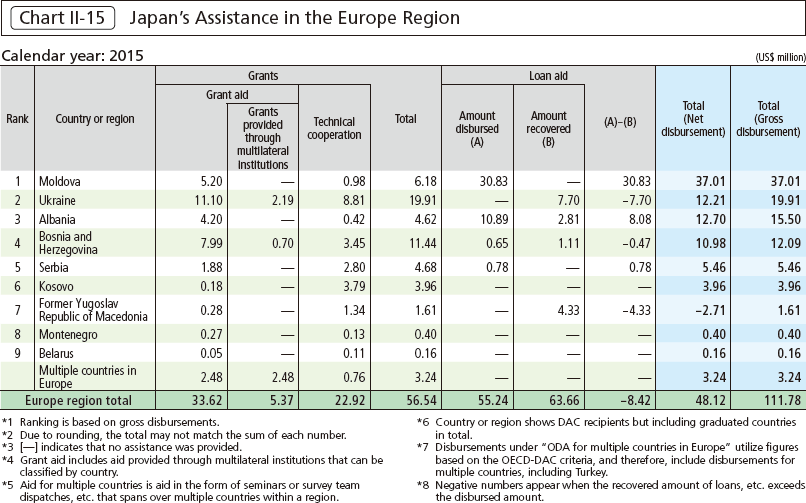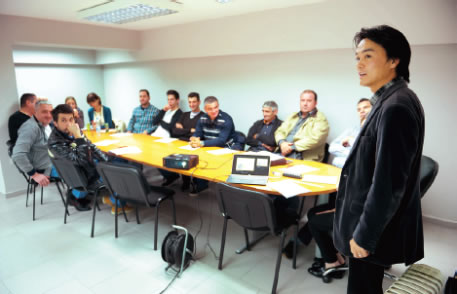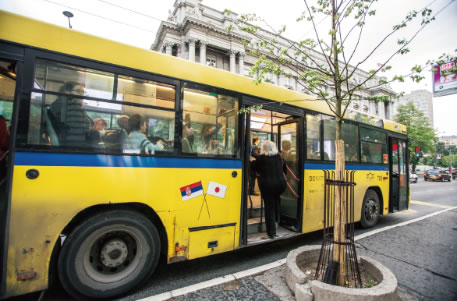8. Europe
Many countries in Central and Eastern Europe and the European region of the former Soviet Union that had previously been under communist regimes have subsequently achieved democratization and liberalization. They are currently pursuing economic development based on market economies under democratic administrations. Japan has provided assistance for efforts such as the transition to market economies, reconstruction of economic infrastructure, and addressing environmental issues. The aim is to further promote stability and development in these regions and in Europe as a whole, as well as to further strengthen relationships based on shared universal values (human rights, democracy, market economy, and rule of law).
<Japan’s Efforts>

Parliamentary Vice-Minister for Foreign Affairs Motome Takisawa attends the handover ceremony for the “Project for Rehabilitation of the Elementary School “Stampar Makarije” in Podgorica in Montenegro provided through the Grant Assistance for Grass-Roots Human Security Project in September 2016.
Reforms had once slowed in the Western Balkans (Note 12) due to the conflicts which occurred in the 1990s. However, assistance from donor countries and international organizations, as well as their own efforts for reform, have enabled them to graduate from the stage of receiving aid for reconstruction. Currently, they are at a stage where they require assistance aimed at sustainable economic development. Japan has provided assistance on the three main pillars of “consolidation of peace,” “economic development,” and “regional cooperation” that were confirmed at the Ministerial Conference on Peace Consolidation and Economic Development of the Western Balkans jointly held by Japan and the EU in 2004, as its priority areas for development cooperation. Japan continues to provide assistance with the “promotion of sustainable economic growth” as its particular priority policy in developing countries in the Western Balkans.
Ukraine and Moldova, part of the former Soviet Union, are geopolitically important since they are located between Russia and the EU. The stability and sustainable development of these countries are indispensable for the stability of Europe as a whole. Assistance in their efforts to consolidate democracy and establish market economies is needed. In this connection, in response to the worsening situation in Ukraine since February 2014, Japan announced and is steadily implementing assistance amounting to approximately $1.85 billion, which is one of the largest scales on an individual country basis, to support Ukrainian reforms. Moreover, in response to the political crisis as well as the worsening of the situation in eastern Ukraine, Japan has provided approximately $6 million for the early recovery of social services and peace-building in the eastern regions, and approximately $30 million to provide humanitarian assistance and infrastructure restoration assistance in the eastern regions. In addition to the provision of funds, Japan is implementing support for democratization, including support for administrative and financial reforms, support for measures to fight against corruption, and media support through technical cooperation.

School staff and children celebrate the improvement of heating equipment with support from Japan at the Stefan Nemanja Elementary School in Gornji Dragaljevac, Bosnia and Herzegovina. (Photo: Satoru Kusayama, Embassy of Japan in Bosnia and Herzegovina)
In light of disparities in economic development in Europe, Japan gradually reduces assistance to new EU member countries, deeming them as having graduated from ODA, and encourages them to become donors to more actively provide development cooperation to developing countries in Europe. Japan also carries out initiatives with these countries, including the Visegrad Group, (Note 13) to share Japan’s experience as a donor. At the same time, Japan is providing assistance to developing countries like those of the Western Balkans and Ukraine, taking into account their economic levels. In addition, regardless of the country receiving aid, Japan focuses more on results, and offering effective and efficient aid by utilizing Japan’s knowledge and experience, while paying attention to the activities of other donor countries and international organizations.
- Note 12: Western Balkans: Albania, Bosnia and Herzegovina, Croatia, Former Yugoslav Republic of Macedonia, Kosovo, Montenegro, and Serbia
- Note 13: Countries of the Visegrad Group: Czech Republic, Hungary, Poland, and Slovakia


•Serbia, Bosnia and Herzegovina, Montenegro
The Project on Establishment and Promotion of Mentoring Service for Small and Medium Enterprises in the Western Balkans
Technical cooperation project (April 2013 – May 2016)

Capacity building programme for SMEs in Montenegro (Photo: JICA)
The three countries of Serbia, Bosnia and Herzegovina, and Montenegro, which are located in the Western Balkans, fell into negative growth due to the impact of the 2008 world financial crisis. Their growth rates have been no more than about 1% to 3% since 2011 when they recovered to positive growth. The growth of SMEs, which account for most domestic companies and hold the majority of domestic employees, is essential for these countries to recover from this situation quickly and revitalize their economies. However, SMEs in the Western Balkans faced difficulties such as an access to finance, administrative procedures, and unequal domestic competition. Furthermore, the support system for SMEs was also fragile, and there was a shortage of human resources who were able to provide support services.
In order to improve this environment, Japan implemented the Project on Institutionalization of Mentoring (2008-2011) with the objective of organizing and consolidating a mentor system to carry out direct consultation and advice for SMEs in Serbia. This project produced major outcomes, and the mentor system was introduced to Serbia. As the reputation of this mentor system has spread, Japan decided to support further dissemination and strengthening of the mentor system in Serbia and to support the establishment of a mentor system in Bosnia and Herzegovina, and Montenegro.
Furthermore, as a new endeavor, the project is implementing consultation meetings hosted by mentors for women entrepreneurs, in order to boost the participation of women in society. A woman manager of a Serbian company that handles organic food products who applied to the mentor system felt that although her business was expanding it was difficult to communicate well with her employees and so it would be difficult for the company to continue to develop as it had been.
She said that thanks to the advice given by the mentor she recognized the importance of obtaining ideas from the employees to make business operations better with the bottom-up approach by respecting and utilizing the first-hand views of workers rather than by a top-down approach. One of the mentors said “As the business grows larger, it becomes more difficult for the manager to solve all the problems by herself. In this context, support for management through the dialogue with a mentor is useful.”
It is expected that economic infrastructure will be strengthened in the Western Balkans and that sustainable growth will be accomplished in the regions through Japan’s support for establishment of a system with a focus on strengthening the support system for SMEs in this way.

A yellow bus donated by Japan running in Belgrade, Serbia. It is used by citizens and recognized as a symbolic partnership project between Japan and Serbia. (Photo: Shinichi Kuno / JICA)
